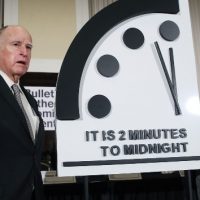
Mark Wilson/Getty Images(NEW YORK) — Gauging the duel threats of nuclear warfare and climate change, scientists are set to announce on Thursday whether to adjust the minute hand of the metaphorical “Doomsday Clock.”
The Bulletin of the Atomic Scientists, comprised of world leaders and Nobel Laureates, is scheduled to make its decision in a live-stream webcast at 10 a.m. Eastern Time.
The “Doomsday Clock” is already set at two minutes before midnight, the closest it has ever come to an apocalyptic meltdown of the world since 1953 during the early years of the Cold War.
In January 2019, the atomic scientific group decided not to move the minute hand, a year after it adjusted the clock ahead 30 seconds.
“We are living in a period of great uncertainty caused by both technology and failures of leadership. It is urgent that we collectively work to reduce the instability that causes,” Robert Latiff — a member of the Bulletin of Atomic Scientists and an adjunct professor at the University of Notre Dame’s Reilly Center for Science, Technology and Values — said in a statement.
Latiff is scheduled to speak at Thursday’s event along with former United Nations Secretary-General Ban Ki-moon, Mary Robinson, the former president of Ireland, and former California Gov. Jerry Brown, who is the executive chairman of the Bulletin of Scientists.
The “Doomsday Clock” was established in 1947, less than two years after the United States dropped atomic bombs on Hiroshima and Nagasaki, Japan, during World War II. The clock was initially set at seven minutes before midnight.
Over the past 71 years, the clock has been adjusted forward and backward. The farthest the minute hand was pushed back from the cataclysmic midnight hour was 17 minutes in 1991 after the Strategic Arms Limitation Treaty was revived and then-President George H.W. Bush and Soviet President Mikhail Gorbachev both announced reductions in the nuclear arsenals of their respective countries.
In 2019, the Bulletin of Atomic Scientists decided not to adjust the minute hand citing what they described as “the new abnormal,” a moment in history “in which fact is becoming indistinguishable from fiction, undermining our very abilities to develop and apply solutions to the big problems of our time.”
“The new abnormal risks emboldening autocrats and lulling citizens around the world into a dangerous sense of anomie and political paralysis,” Rachel Bronson, president of the organization, said at the time.
Copyright © 2020, ABC Audio. All rights reserved.















